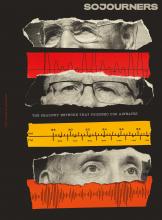“O LORD, HOW long shall I cry for help, and you will not listen?” (Habakkuk 1:2). Ruth Everhart opens her heart-wrenching new book, The #MeToo Reckoning, with this lamentation. In a nation where, according to the Centers for Disease Control and Prevention, more than one in three women are sexually assaulted in their lifetime, lamentation and tears seem a fitting place to start. But Everhart reminds us that to lament is not merely to cry out in anguish. To lament is also to bring pain to light, to air wrongs suffered, and, in the same impassioned breath, to call for justice.
It is this more fulsome form of lamentation that frames Everhart’s book and undergirds her prophetic pronouncement against churches, calling on them to become braver and safer spaces, spaces more protective of the vulnerable, more supportive of victims and survivors, and more committed to seeking justice on their behalf.
Throughout The #MeToo Reckoning, Everhart, a Presbyterian pastor, recounts the incidents of sexual assault that she and others suffered and survived. From being raped inside a church to being assaulted by an elder on an overnight youth trip, these stories make for difficult reading. But they are important reading. Until we face the reality and extent of sexual assault, we will neither be able to properly support its victims nor bring this predatory behavior to an end.
Read the Full Article

